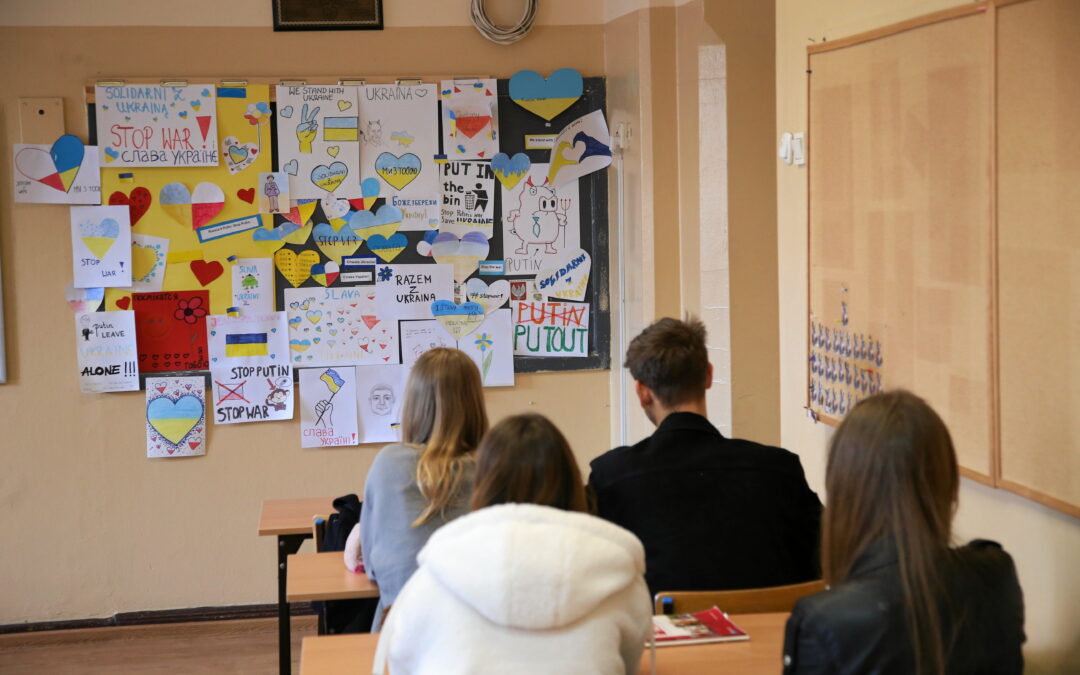Two UN agencies have urged Ukrainian refugees in Poland to register their children in the country’s education system, noting that over half of such children are still not enrolled in Polish schools.
According to Polish government figures, there were nearly 180,000 refugees from Ukraine attending Polish schools and preschools at the end of the recently completed academic year. Meanwhile, between 200,000 and 300,000 school-age Ukrainians remained outside the education system, said the education minister in March.
UNICEF and UNHCR – the UN’s children’s and refugee agencies respectively – note that, among secondary-school-age Ukrainian refugees in Poland, only around one in five (22%) were attending school at the end of the academic year.
500 days after refugees from 🇺🇦 started arriving in large numbers, more than 1/2 of the refugee children do not attend schools in 🇵🇱.@UNICEF and UNHCR urge parents to register their kids in the Polish system. It's key for their education and wellbeing.https://t.co/fb1MQOifHF
— UNHCR Polska (@UNHCRPoland) July 10, 2023
The agencies acknowledge that refugee children not attending school are likely to be enrolled in online studies. But they warn that, while such methods provided useful short-term solutions, in the long run they do not support social development and often have worse educational outcomes.
“Learning face to face in a safe space with peers and teachers is not only important for their education, but is crucial for their socialisation, mental health, and wellbeing,” wrote the agencies in a statement published yesterday.
“Schools go beyond places of learning, especially in times of war,” said Rashed Mustafa Sarwar, country coordinator for the UNICEF Refugee Response Office in Poland.
Around 200,000 Ukrainian refugees have joined schools in Poland, with most placed in regular Polish classes and thousands taking exams in Polish this month
That approach has faced criticism from those who say it places unfair demands on schools and pupils https://t.co/omibLrBPQz
— Notes from Poland 🇵🇱 (@notesfrompoland) May 18, 2022
“They provide children who have already endured loss, displacement and violence with a sense of routine and safety, a chance to build friendships and get help from teachers, and the opportunity to integrate into host communities,” he added.
After Russia’s invasion in February last year, Poland became the main destination for the millions of people fleeing Ukraine. Initially, many parents opted for their children to continue their education in Ukrainian online rather than enrol them in Polish schools in the middle of the academic year.
However, even at the start of the new school year in September, most refugee children remained unregistered. The UN agencies cite overcrowded classes in Polish schools, the language barrier, and refugees’ frequent movement to and from Ukraine as some of the reasons behind the low enrolment rate.
Remote education during the pandemic harmed learning, deepened inequality and damaged physical and mental health, finds the state auditor.
It criticised the government for failing to provide guidelines, leaving schools to rely on "makeshift" solutions https://t.co/U2BetqJcn2
— Notes from Poland 🇵🇱 (@notesfrompoland) February 3, 2022
These problems were discussed earlier this year by UN representatives and Poland’s education minister, Przemyslaw Czarnek, who announced that, if the war continues, there may be a need to introduce a mechanism to make it compulsory for refugee children to be enrolled in the Polish education system, as it is for Polish pupils.
“If this is to continue, we must introduce certain elements of education even if these children do not want to enter a Polish school,” he said, quoted by the Polish Press Agency (PAP). “We cannot afford to have several hundred thousand children from Ukraine out of the education system for a year, two or three years.”
When asked by journalists whether such a mechanism would be introduced from 1 September, when the new school year begins in Poland, the minister replied: “Yes, I think so”.
In a photo essay, we look at the lives of three of the million or so Ukrainian refugees who remain in Poland one year on from Russia's invasion: Liudmyla, a mother; Vlad, an amputee soldier; and Viktoria, a high-school student https://t.co/kdOpEgt2LB
— Notes from Poland 🇵🇱 (@notesfrompoland) February 21, 2023
Main image credit: Cezary Aszkielowicz / Agencja Wyborcza.pl

Alicja Ptak is deputy editor-in-chief of Notes from Poland and a multimedia journalist. She has written for Clean Energy Wire and The Times, and she hosts her own podcast, The Warsaw Wire, on Poland’s economy and energy sector. She previously worked for Reuters.




















